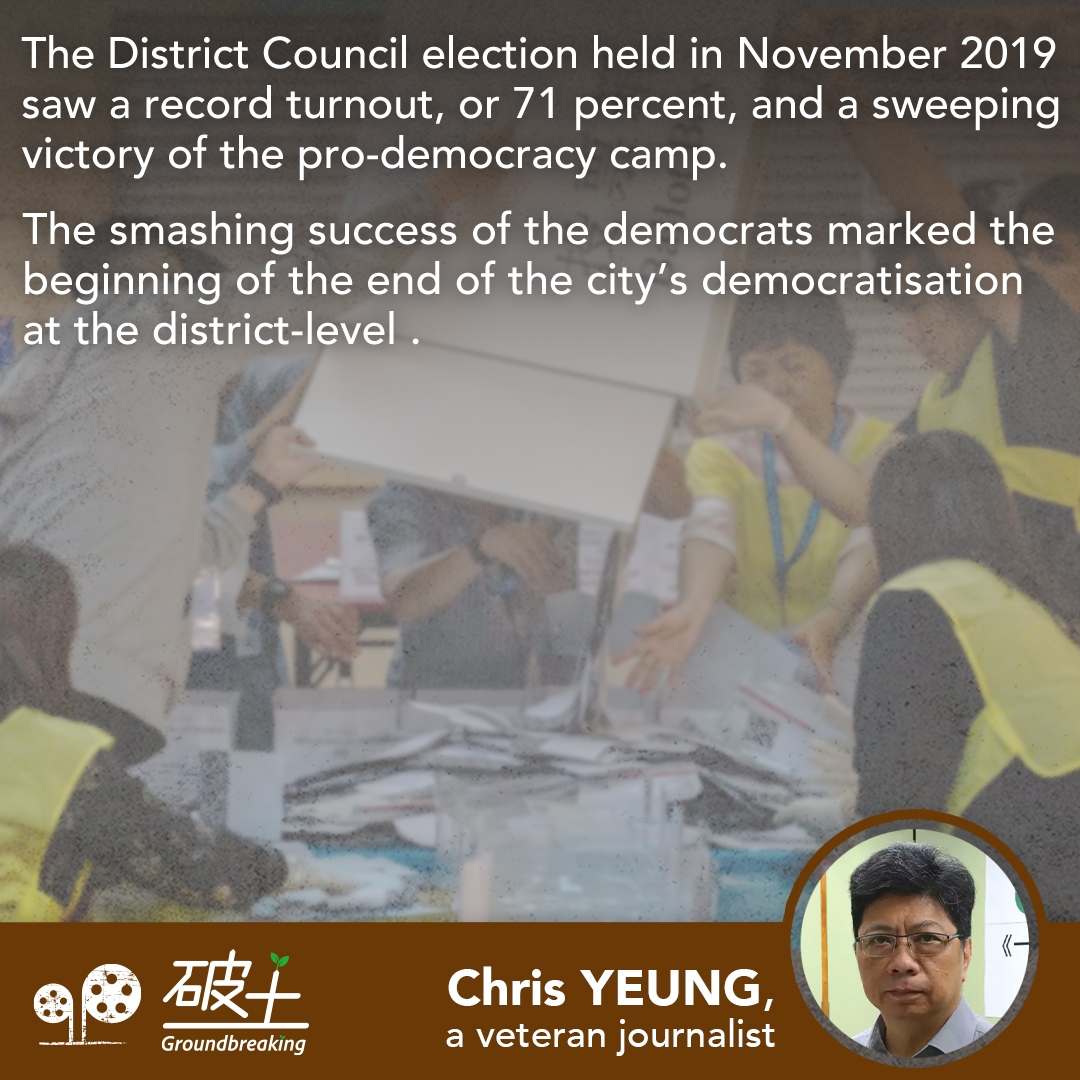A sad story of HK’s district council

Flashed back to 1981, the British colonial government made a belated push for democratisation in Hong Kong as the city’s return to Chinese sovereignty 16 years later, or on July 1, 1997 to be exact, became a not-so-distant, irrevocable reality.
A White Paper on District Administration was published for public consultation. It was followed by the establishment of District Boards (renamed as District Council after 1997) in each district with some members being returned by elections in 1982.
Fast-forward to 2019, almost all members of the 18 district councils were returned by “one person, one vote” geographical election, except for a small number of seats set aside for rural committees.
The District Council election held in November that year saw a record turnout, or 71 percent, and a sweeping victory of the pro-democracy camp.
With hindsight, the smashing success of the democrats marked the beginning of the end of
the city’s democratisation at the district-level .
On last Tuesday (25/4), Chief Executive John Lee gave a glimpse of the Government’s internal review of the fate of the district council in the wake of the 2019 electoral shock.
The incremental increase of democratic elections and roles and powers given to the district bodies since the early 1980s will be undone with a likely big cut of the number of elected seats and a return of government appointees and their roles.
Lee has described the upcoming revamp as a return to the Basic Law, or more specifically, the stipulations district bodies in the relevant provisions. In the words of officials, it is another move to “right the wrong” after the 2019 political turmoil.
Dropping hints that abolition of district councils had been an option, Lee told reporters “district councils deserve to be maintained” as an important part of district administration. But he made it clear future district councils will be composed solely of “patriots” to avoid them from becoming hotbeds for pro-independence elements.
The district bodies, he said, should be “depoliticised” and executive-led. “A certain number of seats chosen by election,” he added, will be retained. The rest will be chosen through various ways, Lee said.
Pundits said the number of seats directly elected by the public will be capped at or below one-third of the 450 elected seats.
Lee said the total number of district council seats and pay and allowances would remain similar to the present arrangements.
Those arrangements, however, will turn out to be the only elements in the decades-long system that will be kept unchanged.
District councils will continue to exist, but largely in name, but no longer in substance.
They will play an advisory role in its narrow sense under the executive-led structure. Their political role as the voice of people will be drastically weakened after the revamp.
Details of the imminent revamp of the district councils are hardly surprising in light of the overhaul of the electoral arrangements for the chief executive and the Legislative Council in 2021.
What is more mind-boggling is the process of the dismantling of the city’s district-level political structure since the watershed November district polls in 2019.
Officials put the blame on the election system for the failure of the pro-establishment camp in the polls, ignoring the fact that the string of fatal mistakes made by former chief executive Carrie Lam in the now-shelved extradition bill had helped canvass votes for the democrats. Put plainly, Lam played a big part in the democrats’ victory.
Pro-establishment political parties have publicly fingered Lam for their humiliation in the 2019 election.
Thanks to their enormous resources, both the Democratic Alliance for the Betterment of Hong Kong and the Federation of Trade Unions had done well in pre-2019 elections. It could not be more ironic that many key pro-Beijing figures who won seats in district councils have now become bashers of the system that helped shoot them to political fame.
With only about six months to go before the next district council elections normally scheduled for November, it is unlikely that there will be public consultation on the district council revamp after the Executive Council gives a nod. Key members in the Legco have already given their backing to the changes even before they are put to Exco for an approval.
The finale of the story of Hong Kong’s district administration system that was originally intended to boost public participation and representation of people’s voice in governance could not be more saddening.
▌[At Large] About the Author
Chris Yeung is a veteran journalist, a founder and chief writer of the now-disbanded CitizenNews; he now runs a daily news commentary channel on Youtube. He had formerly worked with the South China Morning Post and the Hong Kong Economic Journal.